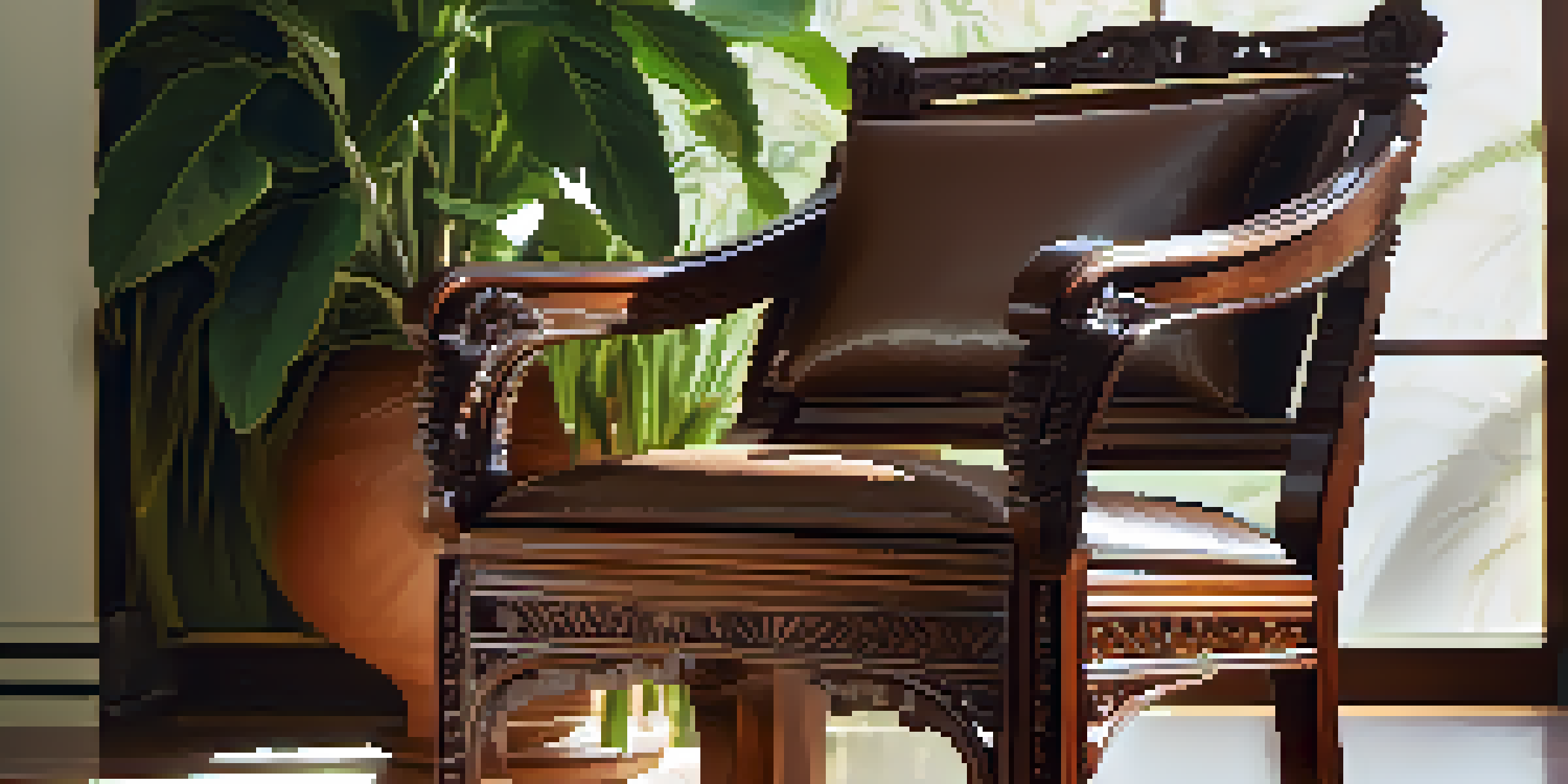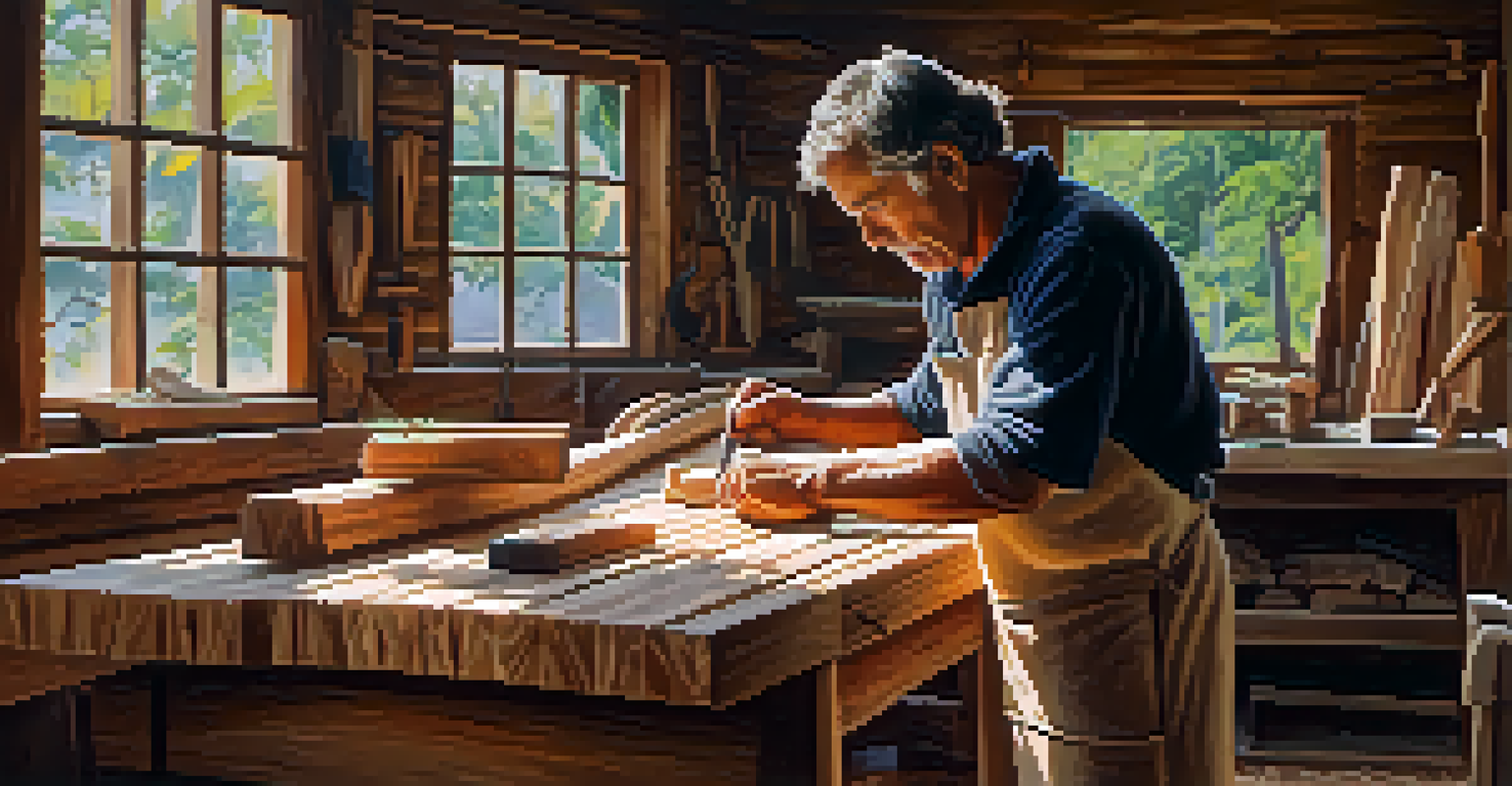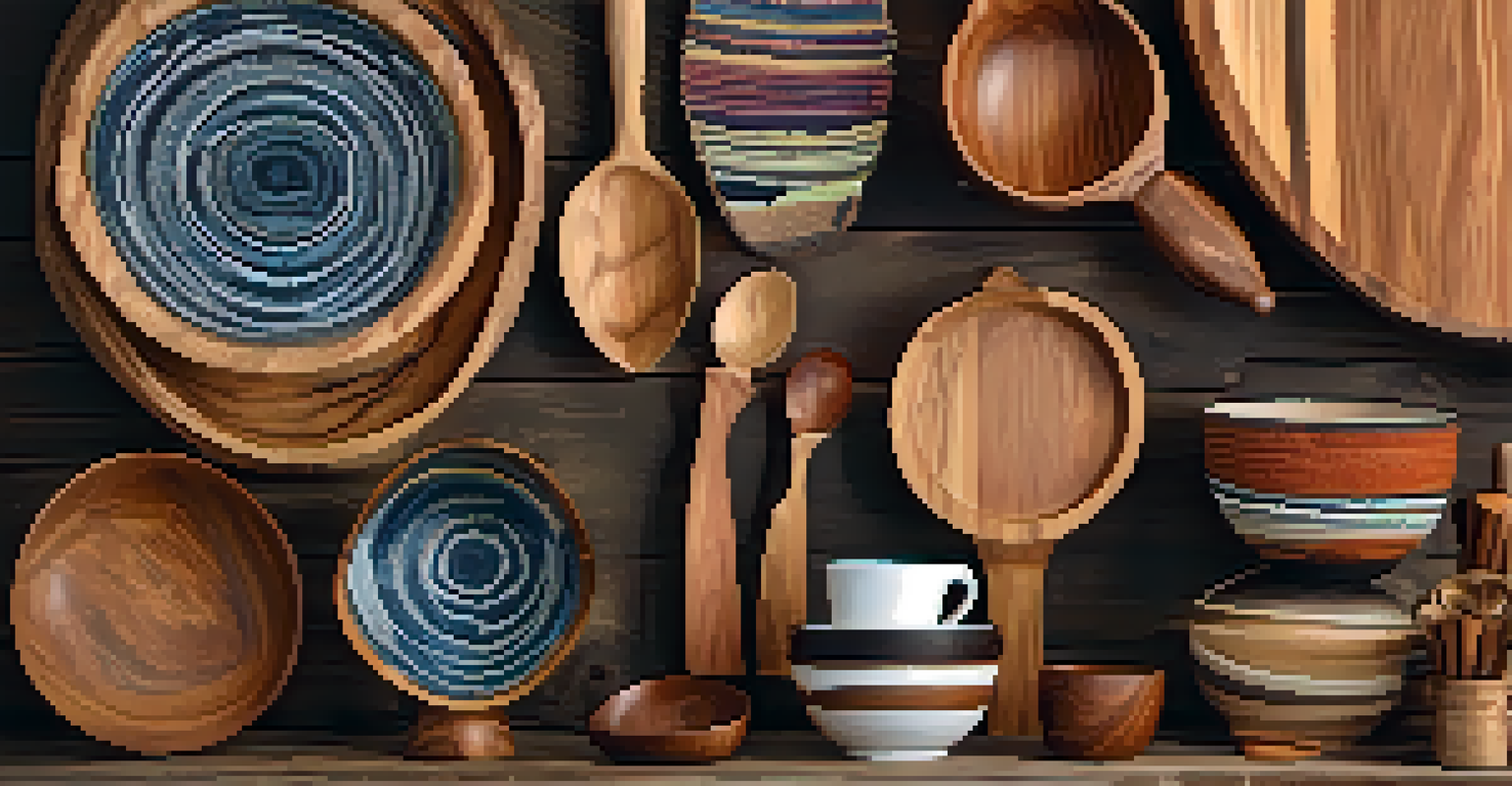The Legacy of Brazilian Woodwork: Craftsmanship and Art

A Glimpse into Brazilian Woodwork's Rich History
Brazilian woodwork has deep roots that trace back to indigenous cultures, where craftsmanship was not just a skill but a way of life. These early artisans created functional and ceremonial pieces, often using local woods like jacaranda and rosewood. Over time, the influence of European colonizers led to a fusion of styles, enriching the craft with new techniques and aesthetics. Today, this blend of tradition and innovation continues to shape Brazilian woodworking.
Craftsmanship is not just a skill, it's a way of life that reflects the values and creativity of its maker.
As we explore this legacy, it’s essential to recognize the cultural significance of woodwork in Brazilian society. Each piece tells a story, reflecting the values, beliefs, and creativity of its maker. From intricately carved furniture to simple utensils, these works embody the spirit of Brazilian craftsmanship. This rich history not only preserves the past but also inspires future generations of artisans.
The appreciation for Brazilian woodwork extends beyond its functionality; it is also a form of art. Many pieces showcase elaborate designs that celebrate nature and Brazilian folklore. These artistic expressions have made Brazilian woodwork a sought-after commodity in galleries and homes worldwide, proving that craftsmanship and artistry are beautifully intertwined.
The Materials: Unique Woods of Brazil
Brazil is home to some of the most diverse and exotic woods in the world, which play a crucial role in its woodwork tradition. Species such as mahogany, teak, and the iconic Brazilian cherry (jatobá) are prized for their beauty and durability. Each type of wood offers distinct characteristics, from color to grain, allowing artisans to choose materials that best fit their design vision.

Moreover, the sustainable sourcing of these woods has become increasingly important in contemporary practices. Artisans are now more conscious of their environmental impact, opting for certified materials that promote responsible forestry. This shift not only protects Brazil's rich biodiversity but also ensures that future generations can continue this cherished craft.
Heritage and Innovation Unite
Brazilian woodwork blends traditional craftsmanship with modern designs, creating a dynamic and evolving art form.
The uniqueness of Brazilian woods also translates to the finished product. Each piece carries the natural markings and textures of the wood, making it a one-of-a-kind work of art. This inherent individuality is part of what makes Brazilian woodwork so appealing, as no two pieces are ever exactly alike.
Techniques Passed Through Generations
The craftsmanship of Brazilian woodworkers is often characterized by techniques that have been passed down through generations. Traditional methods such as hand-carving and joinery showcase the skill and patience of the artisans. These techniques not only highlight the beauty of the wood but also ensure the longevity of the pieces, allowing them to be cherished for years to come.
Artisans are cultural ambassadors who keep the spirit of their heritage alive through their creations.
In addition to traditional methods, many modern woodworkers incorporate contemporary techniques, blending the old with the new. This fusion brings fresh perspectives to the craft, allowing for innovative designs while respecting the legacy of Brazilian woodwork. For instance, the use of CNC machines can enhance precision, yet the finishing touches often remain handcrafted.
This balance between tradition and innovation is what keeps Brazilian woodwork dynamic and relevant. By honoring age-old practices while embracing modern advancements, artisans create pieces that resonate with both history and contemporary aesthetics. This approach not only captivates collectors but also enriches the cultural landscape of Brazil.
The Role of Artisans in Brazilian Culture
Artisans in Brazil are not just craftsmen; they are cultural ambassadors who keep the spirit of their heritage alive. Their work often reflects local customs, folklore, and the vibrant colors of Brazilian life. In many communities, artisans are respected figures, and their workshops serve as important cultural hubs where stories and traditions are shared.
Moreover, the importance of community in woodwork cannot be overstated. Many artisans collaborate with local craftsmen, sharing techniques and ideas, which fosters a sense of camaraderie and support. This network not only strengthens the craft but also ensures that the younger generation remains engaged and inspired to continue these traditions.
Sustainable Practices Matter
Artisans are increasingly prioritizing sustainable sourcing and eco-friendly practices to protect Brazil's rich biodiversity.
Through their creations, artisans contribute to Brazil's cultural identity, making their work a vital part of the nation's heritage. Whether it's a beautifully crafted chair or an intricate sculpture, each piece serves as a testament to the skills and creativity of its maker, enriching the cultural tapestry of Brazil.
Modern Trends in Brazilian Woodwork
In recent years, Brazilian woodwork has seen a resurgence in popularity, with a growing demand for sustainable and artisanal products. Consumers are increasingly drawn to handmade items that tell a story, and Brazilian artisans are stepping up to meet this demand with innovative designs and sustainable practices. This trend is not just about aesthetics; it reflects a broader movement towards valuing craftsmanship over mass production.
Social media platforms have also played a significant role in promoting Brazilian woodwork to a global audience. Artisans showcase their works online, connecting with customers and other craftsmen around the world. This visibility not only helps them reach new markets but also allows them to share their cultural narratives and the importance of their craft.
As a result, we are witnessing a renaissance in Brazilian woodwork, where tradition meets modernity. Artisans are experimenting with new designs while respecting their heritage, resulting in pieces that resonate with contemporary tastes. This blend of old and new ensures that Brazilian woodwork remains relevant and continues to thrive.
Supporting Brazilian Woodwork: Ways to Get Involved
If you're passionate about supporting Brazilian woodwork, there are several ways you can get involved. One of the most impactful actions is to purchase directly from artisans or local cooperatives. This not only helps sustain their livelihoods but also encourages the continuation of traditional craftsmanship. By choosing handmade items, you play a part in preserving this rich heritage.
Another way to support is by spreading the word about the importance of Brazilian woodwork. Sharing stories, attending local exhibitions, or even engaging with artisans on social media can help raise awareness about their work. When more people appreciate and understand this craft, it contributes to its preservation and growth.
Cultural Ambassadors at Work
Brazilian artisans serve as cultural ambassadors, preserving and sharing their heritage through their handcrafted creations.
Lastly, consider participating in workshops or classes offered by local artisans. These experiences provide a unique opportunity to learn about the craft firsthand while supporting the artisans directly. Plus, you’ll gain a deeper appreciation for the skill and dedication that goes into each piece of woodwork, making it all the more meaningful.
The Future of Brazilian Woodwork: A Lasting Legacy
The future of Brazilian woodwork looks promising, with a new generation of artisans ready to carry the torch. As they blend traditional techniques with modern designs, these craftsmen are not only preserving their heritage but also redefining it. This evolution ensures that Brazilian woodwork continues to captivate audiences both locally and globally.
Moreover, the emphasis on sustainability and ethical sourcing is likely to shape the future of the craft. As awareness of environmental issues grows, consumers are increasingly seeking products that reflect their values. Brazilian artisans are responding to this demand by prioritizing eco-friendly practices, ensuring that their craft aligns with a more sustainable future.

Ultimately, the legacy of Brazilian woodwork lies in its ability to adapt and thrive. By honoring their past while embracing innovation, artisans are crafting a future where their work remains relevant and celebrated. This dynamic nature of Brazilian woodwork is what will keep it alive for generations to come.